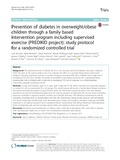Mostrar el registro sencillo del ítem
Prevention of diabetes in overweight/obese children through a family based intervention program including supervised exercise (PREDIKID project): study protocol for a randomized controlled trial
| dc.creator | Arenaza, Lide | es_ES |
| dc.creator | Medrano Echeverría, María | es_ES |
| dc.creator | Amasene, María | es_ES |
| dc.creator | Rodríguez Vigil, Beatriz | es_ES |
| dc.creator | Díez, Ignacio | es_ES |
| dc.creator | Graña, Manuel | es_ES |
| dc.creator | Tobalina, Ignacio | es_ES |
| dc.creator | Maiz, Edurne | es_ES |
| dc.creator | Arteche, Edurne | es_ES |
| dc.creator | Larrarte, Eider | es_ES |
| dc.creator | Huybrechts, Inge | es_ES |
| dc.creator | Davis, Catherine L. | es_ES |
| dc.creator | Ruiz, Jonatan R. | es_ES |
| dc.creator | Ortega, Francisco B. | es_ES |
| dc.creator | Margareto, Javier | es_ES |
| dc.creator | Labayen Goñi, Idoia | es_ES |
| dc.date.accessioned | 2018-10-02T07:58:01Z | |
| dc.date.available | 2018-10-02T07:58:01Z | |
| dc.date.issued | 2017 | |
| dc.identifier.issn | 1745-6215 (Electronic) | |
| dc.identifier.uri | https://hdl.handle.net/2454/30881 | |
| dc.description.abstract | Background: The global pandemic of obesity has led to an increased risk for prediabetes and type-2 diabetes (T2D). The aims of the current project are: (1) to evaluate the effect of a 22-week family based intervention program, including supervised exercise, on insulin resistance syndrome (IRS) risk in children with a high risk of developing T2D and (2) to identify the profile of microRNA in circulating exosomes and in peripheral blood mononuclear cells in children with a high risk of developing T2D and its response to a multidisciplinary intervention program including exercise. Methods: A total of 84 children, aged 8–12 years, with a high risk of T2D will be included and randomly assigned to control (N = 42) or intervention (N = 42) groups. The control group will receive a family based lifestyle education and psycho-educational program (2 days/month), while the intervention group will attend the same lifestyle education and psycho-educational program plus the exercise program (3 days/week, 90 min per session including warm-up, moderate to vigorous aerobic activities, and strength exercises). The following measurements will be evaluated at baseline prior to randomization and after the intervention: fasting insulin, glucose and hemoglobin A1c; body composition (dual-energy X-ray absorptiometry); ectopic fat (magnetic resonance imaging); microRNA expression in circulating exosomes and in peripheral blood mononuclear cells (MiSeq; Illumina); cardiorespiratory fitness (cardiopulmonary exercise testing); dietary habits and physical activity (accelerometry). Discussion: Prevention and identification of children with a high risk of developing T2D could help to improve their cardiovascular health and to reduce the comorbidities associated with obesity. | en |
| dc.description.sponsorship | The current project was supported by the Spanish Ministry of Industry and Competitiveness (DEP2016-78377-R), by “Fondos Estructurales de la Unión Europea (FEDER), Una manera de hacer Europa.” and by the University of the Basque Country (GIU14/21). This work was also supported by grants from Spanish Ministry of Economy and Competitiveness (RYC-2010-05957, RYC-2011-09011), Spanish Ministry of Education, Culture and Sports (FPU14/ 03329) and by the Education, Linguistic Policy and Culture Department of the Government of the Basque Country (PRE_2016_1_0057). | en |
| dc.format.extent | 12 p. | |
| dc.format.mimetype | application/pdf | en |
| dc.language.iso | eng | en |
| dc.publisher | BioMed Central | en |
| dc.relation.ispartof | Trials, (2017) 18:372 | en |
| dc.rights | © The Author(s). 2017 This article is distributed under the terms of the Creative Commons Attribution 4.0 International License, which permits unrestricted use, distribution, and reproduction in any medium, provided you give appropriate credit to the original author(s) and the source, provide a link to the Creative Commons license, and indicate if changes were made. The Creative Commons Public Domain Dedication waiver (http://creativecommons.org/publicdomain/zero/1.0/) applies to the data made available in this article, unless otherwise stated. | en |
| dc.rights.uri | https://creativecommons.org/licenses/by/4.0/ | |
| dc.subject | Type-2 diabetes | en |
| dc.subject | Children | en |
| dc.subject | Exercise | en |
| dc.subject | Family based lifestyle intervention program | en |
| dc.subject | miRNA | en |
| dc.subject | Ectopic fat | en |
| dc.title | Prevention of diabetes in overweight/obese children through a family based intervention program including supervised exercise (PREDIKID project): study protocol for a randomized controlled trial | en |
| dc.type | info:eu-repo/semantics/article | en |
| dc.type | Artículo / Artikulua | es |
| dc.contributor.department | Ciencias de la Salud | es_ES |
| dc.contributor.department | Osasun Zientziak | eu |
| dc.rights.accessRights | info:eu-repo/semantics/openAccess | en |
| dc.rights.accessRights | Acceso abierto / Sarbide irekia | es |
| dc.identifier.doi | 10.1186/s13063-017-2117-y | |
| dc.relation.projectID | info:eu-repo/grantAgreement/ES/1PE/DEP2016-78377-R | en |
| dc.relation.publisherversion | https://doi.org/10.1186/s13063-017-2117-y | |
| dc.type.version | info:eu-repo/semantics/publishedVersion | en |
| dc.type.version | Versión publicada / Argitaratu den bertsioa | es |
Ficheros en el ítem
Este ítem aparece en la(s) siguiente(s) colección(ones)
La licencia del ítem se describe como © The Author(s). 2017 This article is distributed under the terms of the Creative Commons Attribution 4.0
International License, which permits unrestricted use, distribution, and
reproduction in any medium, provided you give appropriate credit to the original author(s) and the source, provide a link to
the Creative Commons license, and indicate if changes were made. The Creative Commons Public Domain Dedication waiver
(http://creativecommons.org/publicdomain/zero/1.0/) applies to the data made available in this article, unless otherwise stated.



